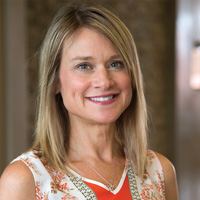
Sandra Liu, professor of consumer sciences and retailing (Photo by Mark Simons)
The central problem: There's a vicious health care cycle in play among low-income, at-risk inner city residents in this country: Substandard living conditions plus the lack of an adequate safety net leads to uninformed lifestyle decision making leads to staggering health problems. Repeat, ad infinitum.
The treatment model, up until now, has simply been reactive: address the symptoms, often repeatedly, at great cost to health care providers, insurance companies and the American public. Not to mention at great detriment to the long-term health of these underserved populations.
Sandra Liu, director of the Center for Global Urban Sustainability: Ensuring Sustainable Health among Underserved (CGUS), has been hard at work advocating for an about face in health care policy that could reverse this harmful trend. Her work focuses on Lake County, Indiana, and the urban communities of Hammond, East Chicago, Calumet and Gary, but the implications apply to urban populations the world over.
"We need to move from simply treating the symptoms of these populations to helping them lead healthier lifestyles," says Liu, professor of consumer sciences and retailing. "It's all about preventive care. We're partnering with hospital systems, community health centers, safety net providers, Boys and Girls Clubs and schools to empower underserved populations and disassemble the link between lower socio-economic status and chronic health problems like diabetes, high blood pressure, obesity, addiction and cancer. Now, the correlation between urban poverty and these endemic health problems is significant."
Various business models have been proposed for containing health care costs while enhancing a population's health and well-being. CGUS takes a community-based participatory approach in forming coalitions among health care and social services providers for underserved populations; builds a uniform platform for stakeholders to work collectively and mobilizes Purdue's interdisciplinary research teams to adapt new discoveries to directly benefit communities. The center also works to make health care more affordable, developing payment models that incentivize the providers and patients to promote healthy living.
"Throughout my life, people have always told me their problems, and I've always been compelled to listen and find solutions," Liu says. "This is my passion now. Through this center, we're working with people and improving their lives together."











